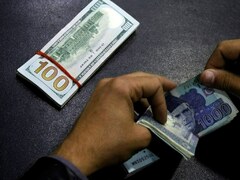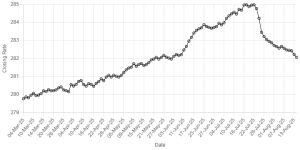The yen advanced against the dollar on Friday, shrugging off weak third-quarter growth figures for Japan as market worries persisted about the huge US deficits. The Japanese currency rose nearly one yen from the day's low around 106.80 per dollar hit soon after data showed Japan's economy grew a real 0.1 percent in July-September from the previous quarter. That was below economists' forecast for growth of 0.5 percent.
"The market move suggests the market isn't paying attention to cyclical economic fundamentals and remains preoccupied with structural problems, namely the US deficit issue," said Kikuko Takeda, a forex manager at Bank of Tokyo-Mitsubishi.
"The dollar had taken a respite, but that gave opportunities for some players to square positions and create fresh dollar shorts," she said.
Helping to dampen dollar sentiment was the currency's failure to build on gains made in the previous two sessions on concerns voiced by European officials about the euro's rapid rise.
The dollar bought around 105.98 yen compared with 106.63 in late trade in New York, where movements were thin due to the Veterans Day holiday. The euro fetched 136.95 yen compared with 137.63.
It fell more than one yen from the day's high as cross euro/yen buying paused as the euro/dollar stabilised.
The single European currency was at $1.2920, slightly up from late US trade, after hitting a fresh high of $1.3006 on Wednesday.
The euro was capped as a chorus of comments from European Central Bank policymakers helped the dollar's cause.
ECB President Jean-Claude Trichet said on Thursday that he stood by a statement he made on Monday in which he described recent euro/dollar movements as "brutal", while colleagues expressed concerns about the pace of the euro's recent gains.
Still, analysts said they were confident the ECB would limit intervention to the verbal kind for the time being. "So long as there is two-way trading - and there has been some selling in the euro - (verbal intervention) probably suits the ECB's goal of keeping volatility manageable," said Naomi Fink, senior currency strategist at BNP Paribas.
Traders and analysts said that activity was being driven by speculation and not logic as few in the market seem able to explain why so much attention has been paid over the past month to the long-standing problem of the US trade and budget deficits.
"The market is now trapped in a twin-deficit syndrome because it's the easiest explanation when there is so much uncertainty," said Mitsuo Imaizumi, deputy general manager of the forex department at Daiwa Securities SMBC.
Some have that uncertainty involved speculation over whether and when China would alter its currency regime, traders said.
China's yuan trades in a narrow range at around 8.28 to the dollar, but it is widely believed to be undervalued and helping Chinese exporters. Beijing has come under pressure, particularly from Washington, to adopt a more flexible currency system.
Such a revaluation would likely support the yen and other Asian currencies.
For now, the dollar's downtrend remains intact, but a decline could be curbed versus the yen as bids have been detected from Japanese importers just below 106 yen while verbal intervention from Europe is seen likely to keep euro buying at bay. "There are a lot of factors contributing to yen buying, but in general, it's an acknowledgement of dollar weakness and investors were keen to sell the dollar at the top when the yen didn't fall to 107 yen," said Tohru Sasaki, chief forex strategist at J.P. Morgan.
BR100
14,996
Increased By
33.9 (0.23%)
BR30
42,261
Increased By
182.2 (0.43%)
KSE100
147,014
Increased By
522.1 (0.36%)
KSE30
44,863
Increased By
30.8 (0.07%)




















Comments
Comments are closed.